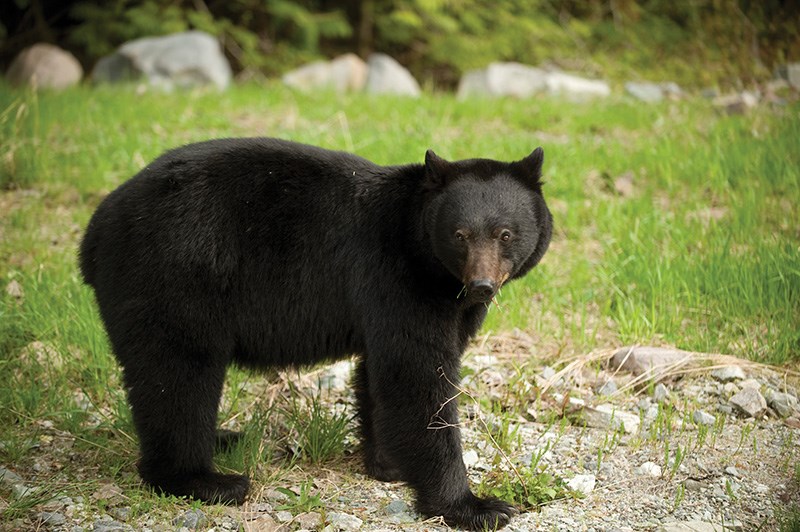More bears have been reported in Squamish this year than in any year since 2004, according to the local expert.
Look around while on a stroll by the Squamish Estuary, on a bike ride through Valleycliffe or on a run in Brackendale and a bear sighting is likely.
“There’s tons of bears in the area,” said Tanner Field, WildSafeBC coordinator. “And they will probably stick around until hibernation.”
It isn’t unusual to see bears in all corners of Squamish, but the number of bears is unique.
The last time this many bears were spotted was in 2004, when the summer weather was similar to this year, Field said.
“We always had bears come into the community in past years. It just hasn’t been this number.”
According to Field, so far in 2015 there have been 313 bear encounters reported.
By comparison, from Jan. 1 to Oct. 5, 2014, there were 122 bear encounters reported.
The abundance of bears is likely because of the summer’s berry crop being early and short, Field said. “So the bears are coming down out of the alpine looking for food. And with the salmon run here, they come down just to gorge.”
As the salmon run comes to an end, however, the bears are starting to look for new food sources from wherever they can.
When bears are under more pressure to find more food, conflicts can arise because the bears can start feeling more protective of their food sources, said Field.
It is more important than ever to be “bear aware,” Field cautioned.
Talking loudly is the best way to scare a bear off, he said. “The human voice is the best deterrent for wildlife. If you are by yourself, maybe sing a song… you don’t want to spook a bear, you don’t want to sneak up on them. So if they can hear you coming, they want to leave – they don’t want to have that interaction.”
Field also recommended residents invest in bear spray. “People tend to think of bear spray as this really extreme measure, but it is like $40 and a really good piece of safety equipment.”
Bear bells, contrary to displays at local tourist shops, are not great at deterring bears, Field said.
“[Bears] don’t associate that noise with humans, so maybe, who knows, it may actually make them curious as to what that noise is and bring them in.”
With so many bears around, off-leash dogs are a problem, he said. After an encounter with a bear, a dog is going to run back to its owner, bear in pursuit. It is best therefore to keep dogs on leash. As always, Squamish residents need to keep their garbage cans locked and follow the district bylaw to not put out their trash bins before 5 a.m. on the day of pick-up.
This is a rule of thumb Field said he often sees broken around the district. He has been going around in the middle of the night and putting warning stickers on those cans he sees out too early, he said.
“Because bears are opportunistic omnivores, they will try anything really and so that is how they end up into our garbage, because they are trying to get as many calories as they can pack on before winter hits.”
Bears typically hibernate starting in November or early December until spring.
“As it gets more mild and if there are food sources around like our garbage, they may not hibernate as early,” Field said.
In addition to locking up garbage, Field said it is important chickens be in secure enclosures and that fruit and nuts from trees are picked up off of the ground.
Representatives from Squamish Climate Action Network (Squamish CAN) will come pick up dropped fruit and will distribute it to organizations that are able to use it, Field said.
When bears come too close for comfort, such as the three bears who visited the fields of Howe Sound Secondary School on Sept. 25 for the acorns in the nearby oak trees, conservation officers intervene. Those particular bears were captured and released back into the alpine, Field said.
It is important that conservation officers be alerted when people come into contact with bears, but Field acknowledged it is an uphill battle trying to counter public perception that conservation officers often kill bears.
Field said he did not have access to numbers on how many bears have been destroyed this year in Squamish, but at least one was killed this summer.
Two bears were destroyed in Squamish in 2014, one in 2013 and 12 in 2012, according to the WildsafeBC 2014 year-end report.
The District of Squamish received Bear Smart accreditation from the Ministry of Environment in 2010.
Destroying a bear is the last resort, Field said.
“Most people think they are doing the bear a favour by not saying anything, when really it is the opposite,” he said. “When people don’t report the bears, that is when things start to escalate without anyone knowing, and all of a sudden we have a problem bear.”
For more on being bear smart go to wildsafebc.com.



